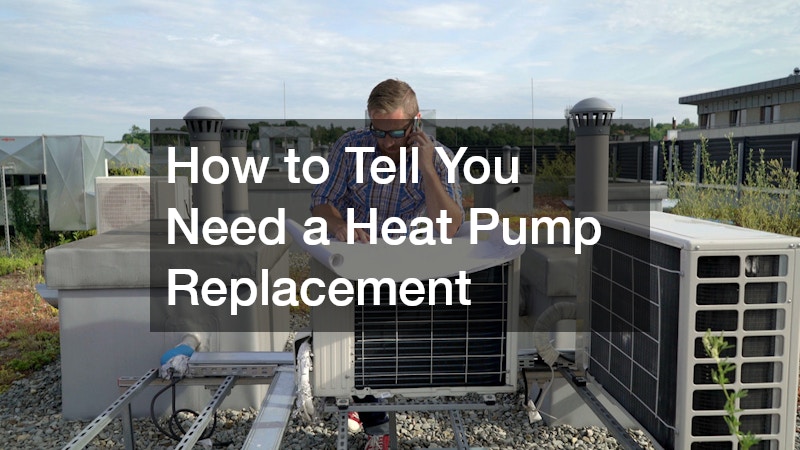Needing a heat pump replacement might seem daunting, but it’s crucial to recognize when it’s time for an upgrade. Recognizing the early signs and understanding the considerations at play can help maintain energy efficiency and comfort in your home.
A heat pump works tirelessly to maintain a comfortable indoor climate, but wear and tear are inevitable. Addressing the signs early can prevent future inconvenience and ensure continued optimal performance.
In this article, we’ll explore the common indicators for replacement, the expected lifespan of heat pumps, the benefits of upgrading, and the seasonal factors that may affect performance. With proper knowledge, homeowners can make informed decisions about their heating systems.
1. What are the Common Signs that You Need a Heat Pump Replacement?
1.1 Unusual Noises and Odors
Unusual noises emanating from your heat pump are often the first sign of internal malfunctions. Grinding, rattling, or squealing sounds can indicate worn-out components that may need replacement.
Similarly, offensive odors can be a symptom of mold growth or burnt-out wires within the system. These issues not only affect air quality but may also signal an imminent breakdown.
When faced with persistent noises or smells, it’s prudent to consult a technician. Ignoring these can exacerbate damage and lead to more extensive repairs or replacement.
1.2 Decreased Efficiency and Increased Energy Bills
A clear sign of a failing heat pump is a noticeable hike in energy bills without a corresponding increase in heating or cooling demands. Systems functioning below optimal efficiency consume more electricity, driving up costs.
If you observe that your home isn’t as comfortable as before, despite using more energy, your heat pump might be the culprit. Inefficient systems work harder to achieve desired temperatures.
Monitoring your energy use can act as an early warning system, prompting timely maintenance or replacement. Upgrading can restore efficiency and reduce utility expenses.
2. How Long Should a Heat Pump Last Before Replacement?
2.1 Average Lifespan of a Heat Pump
On average, heat pumps are designed to last between 10 and 15 years, depending on usage and maintenance. Variations in lifespan can be attributed to quality, installation, and environmental factors.
Older systems may gradually lose effectiveness, necessitating more frequent repairs. Understanding this natural timeline helps in planning replacements proactively.
Predicting the end of a heat pump’s lifecycle leads to efficient financial planning, avoiding unexpected breakdowns. Staying informed ensures preparedness for necessary updates.
2.2 Impact of Maintenance on Heat Pump Durability
Regular maintenance is key to extending the life of your heat pump. Routine inspections and servicing minimize wear and tear, maximizing durability.
A well-maintained heat pump operates efficiently, saving on energy costs while delivering consistent performance. Neglect, on the other hand, accelerates deterioration.
By committing to regular professional evaluations, homeowners can delay costly replacements. Proactive care is an investment in longevity and reliability.
3. What are the Benefits of Upgrading to a New Heat Pump?
3.1 Improved Energy Efficiency
Newer heat pump models boast superior energy efficiency, reducing consumption and operating costs. Technological advancements make modern systems more environmentally friendly.
Upgraded units often have higher SEER and HSPF ratings, marking a significant improvement in heating and cooling efficiency. These benefits result in enhanced eco-friendliness.
Adopting modern systems contributes to a decrease in the carbon footprint, aligning with greener energy solutions. It’s a blend of sustainability and savings.
3.2 Enhanced Comfort and Modern Features
Modern heat pumps provide enhanced comfort through better temperature regulation and airflow. New models offer programmable and smart features for convenience.
Upgrades might include remote control capabilities and personalized settings, adapting to the homeowner’s lifestyle. These features elevate user experience and comfort.
Investing in a new heat pump promises more than efficiency; it enriches daily life with advanced functionalities. A seamless integration of technology into home comfort systems.
4. How Do Seasonal Changes Affect Heat Pump Performance?
4.1 Cold Weather Challenges
During colder months, heat pumps may struggle due to mechanical and efficiency constraints. Ice buildup and freezing temperatures can impede effective operation.
Colder climates demand additional energy as the system works harder to extract heat from external air. This can strain an aging heat pump.
Understanding these conditions allows for preparing strategies to mitigate winter challenges. Professional advice can be invaluable for maintenance and upgrades.
4.2 Impact of Humidity and Summer Conditions
Summer heat and humidity introduce their own set of challenges for heat pump systems. High humidity can compromise a heat pump’s ability to cool effectively.
Increased demand for cooling during peak summer temperatures can overwork an older system, potentially leading to failure. This period tests the unit’s capacity and resilience.
Preparation for these conditions can include preventive maintenance and performance checks. Identifying potential weaknesses early ensures system reliability.
5. When Should You Consult a Professional for Heat Pump Issues?
5.1 Identifying When DIY Fixes Aren’t Enough
It’s essential to know when an issue surpasses DIY solutions, necessitating expert advice. Persistent problems often indicate deeper mechanical failures.
While simple fixes may seem cost-effective, they often provide temporary relief. Professional intervention ensures thorough diagnostics and resolution.
Recognizing the limits of self-repair can prevent accidents and protect your investment. Expertise ensures safety and comprehensive problem-solving.
5.2 Importance of Professional Inspections and Assessments
Regular professional inspections are crucial in evaluating the condition of a heat pump. Experts can accurately diagnose issues, suggesting timely replacements if needed.
Professional assessments provide insights into efficiency and potential system longevity. They ensure that heating systems are operating at their full potential.
Periodic evaluations protect against unexpected malfunctions and maintain home comfort. Trusted professionals offer guidance tailored to homeowners’ needs.

